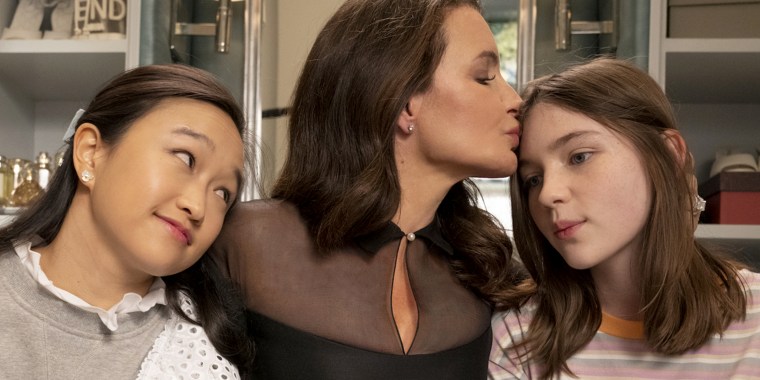Your son or daughter confides that they don't feel like the gender that was assigned to them at birth. How do you react?
It's a major parenting moment, and one that the "Sex and the City" sequel series, "And Just Like That...," tackles in the third episode when Charlotte (Kristin Davis) had a conversation about gender identity with her child, Rose.
The tender moment comes as Charlotte and Rose are lying in bed together, with Charlotte reading a book to her child. In an offhand remark, Charlotte calls her second-born "baby girl," but is surprised by Rose's response.
"I hate when you call me that," Rose says, as Charlotte reacts. "I never feel like a girl."
The scene quickly started a conversation about how to support your child in similar situations. TODAY Parents talked to experts for their advice.
How can you support your child?
1. Affirm
Dr. Samantha Busa, a psychologist and clinical director of the gender and sexuality service at the Child Study Center at Hassenfeld Children’s Hospital at NYU Langone, said that the most immediate thing a parent can do to support a child coming to them with a statement or question about their gender identity is affirm what the child is saying.
"Your support is going to lead to the best outcomes for your child; and that doesn't necessarily mean that you have to know all the answers, but it just means that you're loving and, you know, getting on that journey with them together," Busa said.
2. Listen respectfully
Dr. Joshua Safer, an endocrinologist and the executive director of the Mount Sinai Center for Transgender Medicine and Surgery, said that parents should "listen" and "be respectful" of their child.
"The support starts with trusting the child."
"We have no blood test or scan and can only learn if people are transgender when they tell us," Safer said. "Listening and being respectful does not mean anything with regard to specific treatment. That is an additional conversation which includes the medical team so that logical choices can be made. But the support starts with trusting the child."
3. Find out what your child wants
Different children may want different things: Busa said some children may want to use different pronouns or to go by another name, while some may be looking for the freedom to change their gender presentation or dress differently. In an earlier episode, Rose and Charlotte had a spat about Rose not wanting to wear a floral dress to her sister Lily's piano recital.

Children may also want to discuss looking into options like hormone therapy. Some children may want the news to be public, while others might want to only tell a few trusted friends and family members.
4. Follow your child's lead
"It's really about following your child's lead," Busa said. "We don't want to assume that because your child is identifying as transgender that they want everyone to know right away. Maybe they do, maybe they don't. We really want to be careful not to assume, and so really listening to your child about what transgender means to them, what they want to do and how you can help support them through it."
5. Advocate, navigate, protect
Busa said that parents can be especially helpful as advocates for their children and helping them navigate more complex situations like school systems and gatherings of extended family members. Parents should also respect different names or pronouns that children may want to use.
"The key messaging for any parent that I talk to is really around the fact that your support is protective," Busa said.
"Parental support is the single most important thing someone can do for the child."
Why parents' responses matter
Busa said parental support can be life-saving.
"Parental support dramatically reduces the risk of suicide ... We actually know that parental support is the single most important thing someone can do for the child who is coming to them and saying that they might be trans or that they are trans," Busa said.
Busa also added that data shows that transgender children who are supported by their parents or other community members face lower risks of depression and anxiety.
"We really want (parents) to be sort of affirming and saying ... 'I'm here for you, I love you, I support you,' because we know that is going to help in terms of mental health," Busa said.
Where can parents find more resources?
Busa said that while parents may have questions, it's not necessarily fair to ask a child to answer all of them.
"We don't want to burden a young person with educating us," Busa said.
Instead, she recommends connecting with a trusted doctor or mental health expert, or getting information from sites like the Human Rights Campaign or healthychildren.org, a site operated by the American Academy of Pediatrics. Busa added that many major hospital systems also have information about gender identity.
"All of these places talk about gender identity in a really helpful way," Busa said.
Related:


